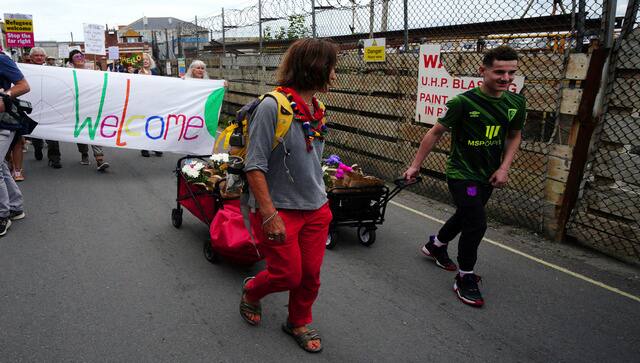In a highly-controversial move, Britain on Monday began moving asylum seekers to a barge in southern England. The UK government’s attempt to reduce the cost of sheltering asylum seekers has drawn howls of protests from human rights activists and locals. Let’s take a closer look: What do we know about the barge? Monday saw 15 people, young males, sent to the Bibby Stockholm. The barge has for weeks been moored on the Portland coast in Southern England. Owned by the UK-based Bibby Marine, is normally used to provide temporary housing for workers when local accommodation isn’t available.
According to Sky, only single men between the age of 18 and 65 will be housed on the Bibby Stockholm.
As per Economic Times, the barge is 93 metres long and has 222 cabins. With three stories of closely packed bedrooms, the barge resembles a college dormitory, though the rooms are utilitarian. It also includes a kitchen, dining area, common rooms and laundry facilities. As per Sky, each room has a shower, two single beds, a window a TV, a desk, and wardrobe. They each have a shower, two single beds, window, TV, desk, wardrobe and further storage. The barge also has WiFi, a reception desk, TV and games and a prayer room that can accommodate all faiths. [caption id=“attachment_12973182” align=“alignnone” width=“640”] A small group of asylum-seekers has been moved to a barge moored in southern England as the government tries to cut the cost of sheltering a rising number of people arriving in the country. AP[/caption] While some reports stated that it can hold up to 500 people, The Guardian reported that number 10 Downing Street said that number could be smaller. Adding to the confusion, The Guardian quoted Rishi Sunak’s spokesperson as saying, “Numbers will increase over time as you would expect for any new asylum facility. My understanding is that the Bibby Stockholm has an upward capacity of 500. We are looking to [reach] that number over time – I don’t think we are aiming to do it by the weekend.” Meanwhile, UK minister Sarah Dines, told BBC Radio 4 that only a few asylum seekers would be on board initially but that number could reach up to 500. “Yes, quite possibly it will be 500. We are hoping,” Dinas said when queried about the asylum seekers being on board the Bibby Stockholm by the end of the week. But CNN quoted Ben Selby, assistant general secretary, as saying that the barge had been ‘retrofitted’ for just 222 people. Pressed on whether all of them could be onboard by the end of the week, Dines said the increase in the number of people on the ship would be gradual. Sky reported that the British government intends to keep the asylum seekers on the vessel for between three and six months. However, that period could extend as long as nine months. While residents are free to come and go as they please, they will be required to sign a register and pass through port security. According to the website, the asylum seekers will also go through ‘robust security checks’ before being transferred to the barge. Why are people outraged? The decision to dock the vessel in Portland, a small island with a population of about 13,600 people, has prompted a backlash from some locals, including its Conservative MP, who argue the area is ill-suited to the task. As per Middle East Eye, the Fire Bridges Union (FBU) has voiced safety concerns.
A small group of asylum-seekers has been moved to a barge moored in southern England as the government tries to cut the cost of sheltering a rising number of people arriving in the country. AP[/caption] While some reports stated that it can hold up to 500 people, The Guardian reported that number 10 Downing Street said that number could be smaller. Adding to the confusion, The Guardian quoted Rishi Sunak’s spokesperson as saying, “Numbers will increase over time as you would expect for any new asylum facility. My understanding is that the Bibby Stockholm has an upward capacity of 500. We are looking to [reach] that number over time – I don’t think we are aiming to do it by the weekend.” Meanwhile, UK minister Sarah Dines, told BBC Radio 4 that only a few asylum seekers would be on board initially but that number could reach up to 500. “Yes, quite possibly it will be 500. We are hoping,” Dinas said when queried about the asylum seekers being on board the Bibby Stockholm by the end of the week. But CNN quoted Ben Selby, assistant general secretary, as saying that the barge had been ‘retrofitted’ for just 222 people. Pressed on whether all of them could be onboard by the end of the week, Dines said the increase in the number of people on the ship would be gradual. Sky reported that the British government intends to keep the asylum seekers on the vessel for between three and six months. However, that period could extend as long as nine months. While residents are free to come and go as they please, they will be required to sign a register and pass through port security. According to the website, the asylum seekers will also go through ‘robust security checks’ before being transferred to the barge. Why are people outraged? The decision to dock the vessel in Portland, a small island with a population of about 13,600 people, has prompted a backlash from some locals, including its Conservative MP, who argue the area is ill-suited to the task. As per Middle East Eye, the Fire Bridges Union (FBU) has voiced safety concerns.
The FBU, citing narrow corridors, a lack of life jackets, and locked gates, has labelled the barge a ‘potential deathtrap’.
“Firefighting operations on vessels such as the Bibby Stockholm provide significant challenges and require specialist training and safe systems of work. The diminished safety provisions only exacerbate our operational concerns,” Ben Selby, the assistant general Secretary of the FBU wrote. The website also quoted Dorset councillors as describing the evacuation point – a quayside compound – as “completely inappropriate". CNN quoted chief executive of the UK Health Security Agency chief executive Jenny Harries as saying that respiratory infections were likely to spread. .“Generally respiratory infections, as we’ve all learnt through the pandemic … are at higher risk in confined settings with poorer ventilation, so the sorts of things we look at is what the ventilation is like,” Harries told BBC Radio 4’s “Today” show on Monday. Others have opposed the plan because of concern about the impact on the small surrounding community, which already has a shortage of medical services and is connected to the mainland by a single road. Economic Times quoted Portland resident Richard Hatfield as saying, “Refugees have become such a divisive topic on a local and national scale” Hatfield does not support the project. However, others loclas have lent support to the plan. [caption id=“attachment_12973192” align=“alignnone” width=“640”] Supporters carry welcome packs they have made as they hold placards outside Portland Port before the first asylum seekers arrive to board the Bibby Stockholm. AP[/caption] Meanwhile, rights groups have complained that it is inappropriate to house asylum-seekers in such accommodation. A charity for refugees, Care4Calais, said lawyers who intervened got transfers cancelled for about 20 asylum-seekers. “Amongst our clients are people who are disabled, who have survived torture and modern slavery and who have had traumatic experiences at sea,” said Steve Smith, the group’s CEO. “To house any human being in a ‘quasi floating prison’ like the Bibby Stockholm is inhumane.” Steve Valdez-Symonds of Amnesty International UK branded the barge “a shameful way to house people who’ve fled terror, conflict and persecution”. It was previously used by Germany and the Netherlands to house homeless people and asylum-seekers, but opponents in Britain have noted it was previously described as an “oppressive environment”. UK government defiant But the government remains insistent on following its plan through. The UK government wants to use barges and former military bases to accommodate some migrants after the cost of housing them in hotels soared to $2.4 billion last year. As per Sky, the British government is currently spending $7.6 dollars to keep 51,000 migrants at hotels.
Supporters carry welcome packs they have made as they hold placards outside Portland Port before the first asylum seekers arrive to board the Bibby Stockholm. AP[/caption] Meanwhile, rights groups have complained that it is inappropriate to house asylum-seekers in such accommodation. A charity for refugees, Care4Calais, said lawyers who intervened got transfers cancelled for about 20 asylum-seekers. “Amongst our clients are people who are disabled, who have survived torture and modern slavery and who have had traumatic experiences at sea,” said Steve Smith, the group’s CEO. “To house any human being in a ‘quasi floating prison’ like the Bibby Stockholm is inhumane.” Steve Valdez-Symonds of Amnesty International UK branded the barge “a shameful way to house people who’ve fled terror, conflict and persecution”. It was previously used by Germany and the Netherlands to house homeless people and asylum-seekers, but opponents in Britain have noted it was previously described as an “oppressive environment”. UK government defiant But the government remains insistent on following its plan through. The UK government wants to use barges and former military bases to accommodate some migrants after the cost of housing them in hotels soared to $2.4 billion last year. As per Sky, the British government is currently spending $7.6 dollars to keep 51,000 migrants at hotels.
The government claims a barge like the Bibby Stockholm hosting asylum seekers will work out ‘significantly cheaper than hotels’.
It estimated the total cost of keeping asylum seekers on board such a vessel at $25,000 per day. Dines was quoted by The Guardian as saying that people would slowly be transferred to the barge. Dines told the BBC that people arriving in the UK via unauthorized means should have “basic but proper accommodation” and that they “can’t expect to stay in a four-star hotel.” Cheryl Avery, director for asylum accommodation for the Home Office said more were expected to arrive later as authorities seek to reduce the number of asylum-seekers housed in expensive hotel rooms that were requisitioned on an emergency basis as the number of arrivals has surged in recent years. Avery said there had been some “minor legal challenges” to the transfers, but wouldn’t elaborate. With inputs from agencies
)